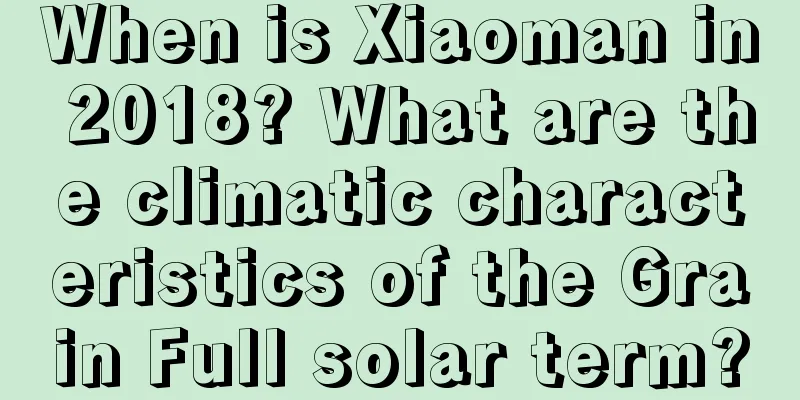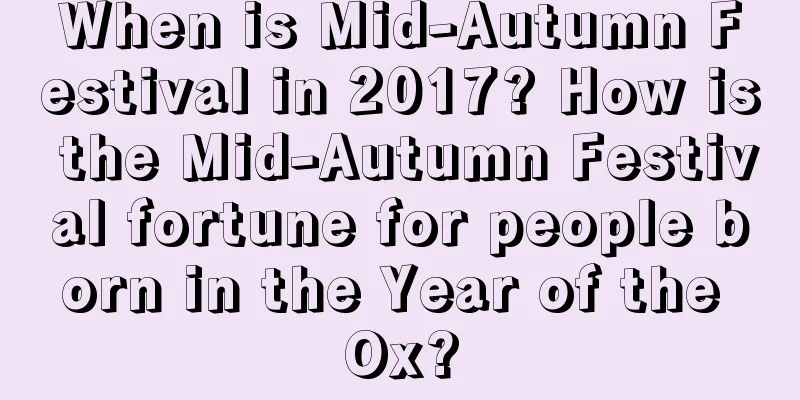When is Xiaoman in 2018? What are the climatic characteristics of the Grain Full solar term?

The summer solstice is approaching, the grain is coming, and the hot weather is hitting us mercilessly. So, what are the specific climatic characteristics of the Grain Full solar term? Let’s take a look together. The beauty of April on earth has faded, and the peach blossoms in the mountain temple are beginning to bloom. The beautiful fourth month of the lunar calendar is coming, and the fortune teller website will help you understand the fourth month of the lunar calendar in 2018.When is Xiaoman in 2018?Grain Full is one of the 24 solar terms and the second solar term in summer. Grain Full Moon occurs when the sun reaches 60° of the ecliptic longitude between May 20 and 22 every year.The Grain Full Moon in 2018 falls on the seventh day of the fourth month of the lunar calendar in 2018 (lunar calendar), which corresponds to Monday, May 21, 2018 in the Gregorian calendar. It is the first solar term in the fourth month of the lunar calendar in 2018. What are the climatic characteristics of the Grain Full solar term?The Grain Full season is when summer crops bear fruit and is a busy season for agriculture. Grain Full, one of the 24 solar terms, is the second solar term after the beginning of summer, indicating that the climate is beginning to warm up, the temperature is gradually rising, the temperature difference between the north and the south is further narrowing, and the precipitation will further increase.Southern region: "Xiaoman, Daman and the rivers are full" reflects the climate characteristics of this region with frequent rainfall and heavy rainfall. Generally speaking, if the cold air from the north can penetrate into the southern regions of my country at this time, and the warm and humid air flow in the south is also strong, it will easily cause heavy rain or extremely heavy rain in southern China. Therefore, the late period of the Grain Full solar term is often a tense period for flood prevention in these areas. The middle and lower reaches of the Yangtze River: "If there is no Grain Rain, there will be less plum rains", "If there is no rain in Grain Rain, there will be no water in Grain in Ear". For the middle and lower reaches of the Yangtze River, if there is less rainfall during this period, it may be that the subtropical high pressure over the Pacific Ocean is weaker and located to the south, which means that when the plum rain season comes, there may be less precipitation. Therefore, there is a folk saying that "if there is no rain in Grain in Ear, there will be less rain in the Grain in Ear". The middle and lower reaches of the Yellow River: "If Grain Full is not fully harvested, the wheat crop will be in danger." During the Grain Full solar term, there is a saying circulating in the middle and lower reaches of the Yellow River and other areas: "If Grain Full is not fully harvested, the wheat crop will be in danger." The "one danger" here refers to the fact that the wheat has just entered the milky stage and is very vulnerable to dry and hot winds, which can lead to insufficient grain filling, shriveled grains and reduced yields. There are many ways to defend against dry and hot winds, such as creating protective forest belts and spraying chemicals, which are very effective measures. Jiangnan region: "During Xiaoman, three cars are moving, and people are so busy that they don't even notice anything else." The three wheels here refer to the water wheel, oil wheel and silk wheel. At this time, the crops in the farmland need plenty of water, so the farmers are busy pedaling the waterwheels to turn the water; the harvested rapeseed is also waiting for the farmers to pound it to make fragrant rapeseed oil; farm work in the fields naturally cannot be delayed. But the silkworms at home also need to be carefully cared for. Around the Grain Full Festival, the silkworms will start to spin cocoons, and the silkworm farmers will be busy spinning silk reels. It is recorded in "Qing Jia Lu": "When Xiaoman comes, the silkworm women boil cocoons, prepare silk spinning wheels and reel silk, working day and night." It can be seen that in ancient times, during the Grain Full solar term, new silk was about to be put on the market, and the silk market was about to boom. Silkworm farmers and silk merchants were all full of expectations, waiting for the harvest day to come. In addition, during the Grain Full solar term, rivers and lakes in the Jiangnan region are often full. If they are not, it must be a year of drought and little rain. There are many proverbs in this regard. For example, in Anhui, Jiangxi and Hubei provinces, there is a saying that "If the Grain Full is not fully harvested, there will be no water to wash dishes"; in Guangxi, Sichuan, Guizhou and other regions, there is an agricultural proverb that "If the Grain Full is not fully harvested, the field ridges will dry up"; in Sichuan Province, there is also a saying that "If the Grain Full is not harvested, the plows and harrows will be hung high". The word "full" here does not mean that the crops are full, but that there is a lot of rain. |
<<: When is the Grain Full solar term in 2018? What are the three signs of Grain Full?
>>: When is Xiaoman? What are the customs of Xiaoman?
Recommend
Is it a good idea to move house in 2019 during the Frost Descent? Can I choose to move in before moving?
Frost Descent is one of the 24 solar terms, and al...
What are the nicknames for the twelfth month of the lunar calendar? Introducing the nicknames for the twelfth month of the lunar calendar!
The twelfth month of the lunar calendar refers to ...
Is November 16th of the lunar calendar in 2021 suitable for moving house? Is it a good day?
The eleventh month of the lunar calendar belongs t...
Choosing a date for moving into new house - Can I move on Women's Day in 2020? Is it auspicious?
Moving house is a matter of Feng Shui and must be ...
Is Children's Day a traditional Chinese festival? Is it okay to get engaged on Children's Day, June 1, 2020?
Introduction: Children's Day is an important f...
Things to note during the heavy snow in 2018, what are the characteristics of the heavy snow solar term?
Heavy snow, as the name suggests, means a large am...
Where is the position of the God of Happiness in the Year of the Rooster? How to welcome the God of Wealth
Introduction: Our country is a traditional country...
Is it a good day to open a new store on the second day of February 2019?
Spring is a great time full of vitality, with eve...
Is it a good idea to move into the new house on July 26th of the lunar calendar in 2019?
The moving day is not just a day you say, you sti...
Analysis of the date of September 30th in the lunar calendar in 2021. Can we worship our ancestors on that day?
It is also necessary to choose a time to worship a...
Can a funeral be held on the 15th day of the second lunar month in 2019? What is the auspiciousness or inauspiciousness of this day?
Within twenty-four hours after the death of the de...
Is it suitable to move house on May 18th of the lunar calendar in 2017? Is it okay to move into the new house?
Introduction: Our country is a typical traditional...
Is it suitable to move house on June 21st of the lunar calendar in 2022? Is this an auspicious day?
The sixth month of the lunar calendar is the last ...
Is it okay to get married on the tenth day of the seventh lunar month in 2018, or get engaged and get a marriage certificate?
July has beautiful names such as Qiao Yue, Gua Yu...
Is April 30th of the lunar calendar in 2018 an auspicious day?
Is the last day of April suitable for happy events...









